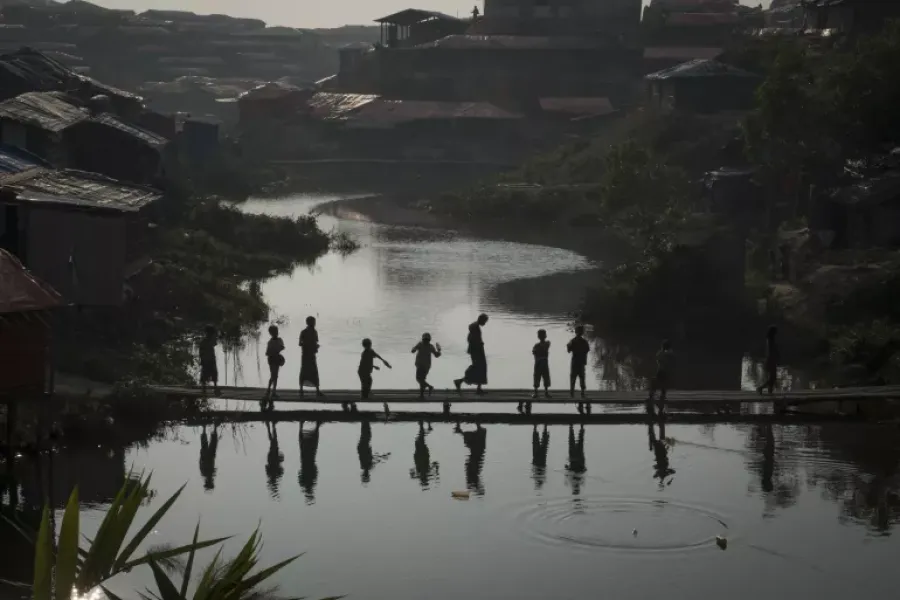Seven years after forced mass displacement of Rohingya from Myanmar, deadly attacks on children continue in Rakhine State
২৫ আগস্ট ২০২৪
24 August 2024

NEW YORK/KATHMANDU/BANGKOK, 25 August 2024 – Seven years after hundreds of thousands of Rohingya people fled violence and persecution in Myanmar, conflict continues to intensify in Rakhine State, on the western coast of Myanmar, with a surge in casualties and displacement in Maungdaw Township and reports of increasing numbers of people seeking shelter and protection in Bangladesh.
UNICEF has received alarming reports that civilians, particularly children and families, are being targeted or caught in the crossfire, resulting in deaths and severe injuries. Humanitarian access in Rakhine has become extremely challenging. Critical services, including access to safe water and healthcare are jeopardized, exacerbated by electricity, telecommunications and internet blackouts since January. This is impacting both civilian activities and humanitarian operations.
“Seven years after a deadly wave of violence forced thousands of families from their homes in search of safety, new reports of violence are painful reminders of the continuing threats to children in Myanmar,” said UNICEF Executive Director Catherine Russell. “In Rakhine and across the country, children and families continue to pay the price for conflict, with their lives, livelihoods, and futures. Parties to the conflict must uphold their obligations to protect children.”
On 5 August 2024, artillery shelling and drone attacks reportedly killed about 180 people, including a significant number of women and children, near the bank of the Naf River, which marks the border between southeastern Bangladesh and northwestern Myanmar, as they attempted to escape hostilities. On the same day, an estimated 20,000 people were reportedly displaced from three downtown Maungdaw wards.
In separate incidents on 6 and 19 August, boats carrying dozens of people - including women and children – sank in the Naf River, with children among the casualties, the latest in a series of capsizing incidents involving children.
Since 13 November 2023, the escalating conflict has displaced an estimated 327,000 people in Rakhine State and Paletwa Township in Chin. This brings the total current estimated internal displacement in Rakhine State to well over half a million people.
Across Myanmar, the humanitarian crisis that escalated in February 2021 continues to rapidly deteriorate, with children bearing the heaviest burden of unabating violence, including grave violations, mass displacement, and the near collapse of health and education service provision systems. Escalating attacks and clashes have displaced an estimated 3.3 million people, nearly 40 per cent of whom are children. In 2024, a record 18.6 million people - nearly one-third of the country's population – including 6 million children, require humanitarian assistance.
The Rohingya population who fled attacks and violence in 2017, joined refugees already in Bangladesh from previous waves of displacement. Together, they total almost one million displaced people. Seven years later, about half a million Rohingya refugee children are growing up in the world’s largest refugee camp, with many of them born there as refugees. The refugee community relies entirely on humanitarian assistance and lives in temporary shelters in highly congested camp settings. Working with the Interim Government of Bangladesh and partners, UNICEF provides water and sanitation, establishes diarrhoeal treatment centres, enables access to health and nutrition services for children and pregnant women, as well as to quality education; and supports children affected by violence, abuse and neglect with protection and response services.
“Bangladesh’s continued support to the refugee population – especially children - is both commendable and critical,” said Russell. “Over the past 12 months, we have been increasingly concerned about the security situation in the camps and reports of child rights violations. We stand ready to support the new Interim Government of Bangladesh to ensure that these children are protected and have access to critical services.”
In Myanmar, UNICEF calls on all parties to the conflict to uphold their obligations under international humanitarian law and international human rights law to protect civilians, particularly children, and ensure their safety and well-being. UNICEF also calls for safe and unimpeded access to deliver humanitarian aid by all humanitarian actors.
Media Contact in Bangladesh: Faria Selim, Communication Specialist at UNICEF, fselim@unicef.org











